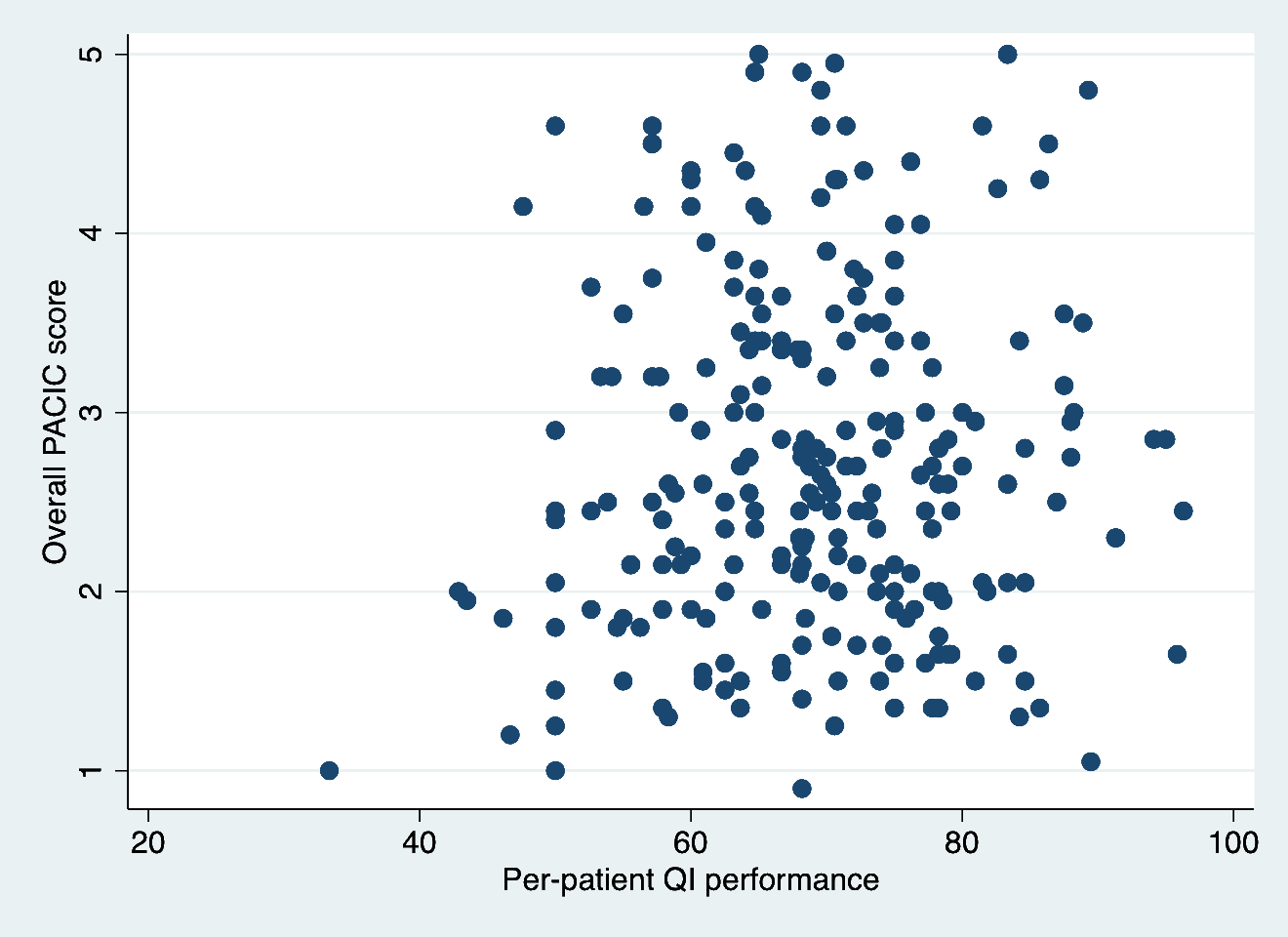Session Information
Session Type: Poster Session C
Session Time: 1:00PM-3:00PM
Background/Purpose: Systemic lupus erythematosus (SLE) is a chronic multisystem autoimmune disease associated with frequent healthcare interactions. The Chronic Care Model is a widely accepted framework for improving quality of care by transforming care from acute and reactive to planned and proactive. Little is known about patient perspective on care quality, or whether it is associated with traditional quality indicators (QI). Our aim was to measure the patient perspective of chronic illness care quality in SLE, and evaluate whether it is associated with the technical quality of SLE care.
Methods: Patients with SLE (n = 258) were recruited in 2016 from academic and community specialist settings in Melbourne, Australia. The Patient Assessment of Chronic Illness Care (PACIC) questionnaire was utilised to evaluate the patient perspective of chronic illness care quality. There are 20-items within 5 categories and each item is scored using a scale from 1 for “Never” to 5 for “Always”. Technical quality of care was assessed using 31 validated SLE QIs encompassing diagnostic work-up, disease and comorbidities assessment, drug monitoring, preventative care and reproductive health(1, 2). Data were obtained from the Australian Lupus Registry and Biobank, electronic medical records and patient questionnaires. We used descriptive statistics to analyse the PACIC overall (total score of the 20 items divided by 20) and category scores (total category score divided by the number of items within the category), and Pearson correlation to determine the association between the overall PACIC score and per-patient lupus QI performance.
Results: The mean (SD) overall PACIC score (scale 1-5) was 2.75 (0.97). Among score categories, the Coordination of Care category had the lowest mean score of 2.28 (1.04). Items with the lowest mean scores included accessing resources such as community programs (1.60 (1.14)) or support groups (1.66 (1.19)) and referral to allied health professionals (1.78 (1.28)). Mean (SD) per-patient QI performance was 69.1% (11.2). We did not find a statistically significant correlation between the overall PACIC score and per-patient lupus QI performance (r = .06, p = .38) (Figure 1).
Conclusion: A lack of correlation between the PACIC with the SLE QIs suggests these instruments measure different aspects of care quality. We identified gaps in care delivery related to care coordination, important in a multisystem disease, and accessing community resources and allied health care. This should be addressed with better multidisciplinary care models for this complex multi-organ disease.
References:
1. Mosca M, Tani C, Aringer M, Bombardieri S, Boumpas D, Cervera R, et al. Development of quality indicators to evaluate the monitoring of SLE patients in routine clinical practice. Autoimmun Rev. 2011;10(7):383-8.
2. Yazdany J, Panopalis P, Gillis JZ, Schmajuk G, MacLean CH, Wofsy D, et al. A quality indicator set for systemic lupus erythematosus. Arthritis Rheum. 2009;61(3):370-7.
To cite this abstract in AMA style:
Sreedharan S, Littlejohn G, Buchanan R, Nikpour M, Morand E, Hoi A, Golder V. Patients with Systemic Lupus Erythematosus Perceive the Quality of Care They Receive to Be Suboptimal [abstract]. Arthritis Rheumatol. 2022; 74 (suppl 9). https://acrabstracts.org/abstract/patients-with-systemic-lupus-erythematosus-perceive-the-quality-of-care-they-receive-to-be-suboptimal/. Accessed .« Back to ACR Convergence 2022
ACR Meeting Abstracts - https://acrabstracts.org/abstract/patients-with-systemic-lupus-erythematosus-perceive-the-quality-of-care-they-receive-to-be-suboptimal/

